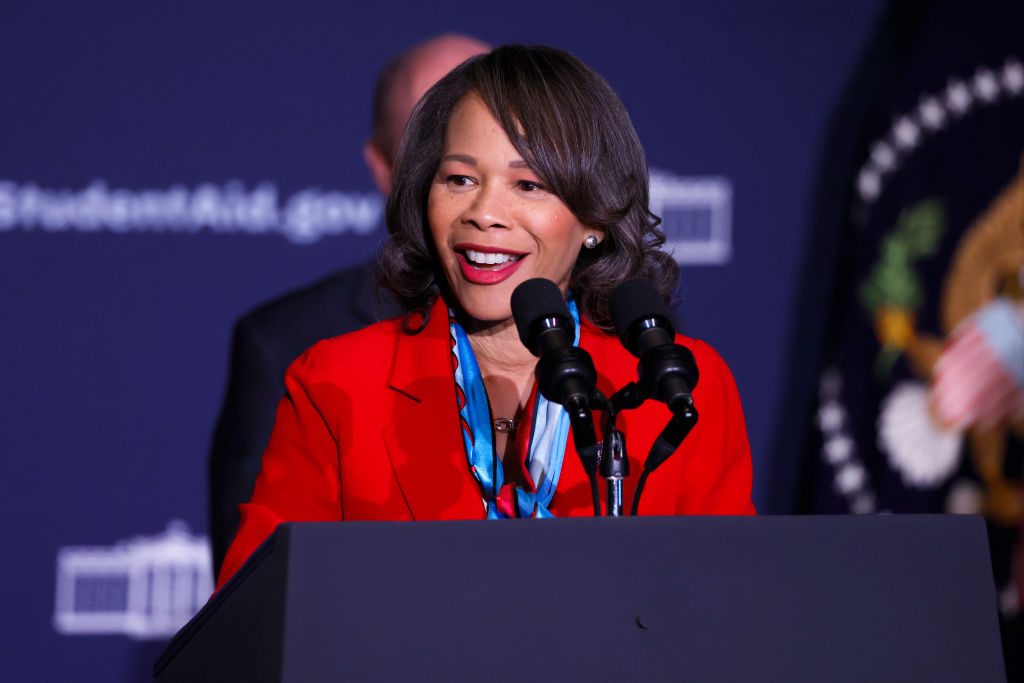Lisa Blunt Rochester Described As Shoo-In Candidate Amid Concerns About ‘Representation In The Senate’
Rep. Lisa Blunt Rochester speaks at Delaware State University on October 21, 2022, in Dover, Delaware. | Source: Anna Moneymaker / Getty
The newly announced candidacy of Lisa Blunt Rochester exponentially increases the chances that the U.S. Senate will have at least one Black woman among its ranks next year amid lingering concerns about the need for such elusive legislative representation.
Blunt Rochester, a 61-year-old congresswoman from Delaware first elected in 2017, threw her hat in the ring on Wednesday by confirming she would indeed run for Sen. Thomas Carper’s seat after the incumbent announced his upcoming retirement at the end of his term.
I’m running to represent Delaware in the United States Senate.
I’m filled with Bright Hope for our future. But a more perfect union isn’t a destination. It’s a journey. Let’s go on it together.
Join me https://t.co/tymKWayXko pic.twitter.com/VeXvchGV0v
— Lisa Blunt Rochester (@LisaBRochester) June 21, 2023
If elected, Blunt Rochester would be the first woman and first Black U.S. Senator in Delaware history.
She could also become among the first Black women elected to the U.S. Senate since Kamala Harris — only the second-ever Black woman U.S. Senator — ceded her seat to ascend to the vice presidency of America in 2020.
Blunt Rochester is among three Black women vying for U.S. Senate seats in the 2024 election. But out of the three U.S. Senate candidates, Rochester may be the most sure-fire bet of them all to not only win the Democratic nomination but also go on to win in the general election.
She was reportedly “handpicked” to succeed Carper and enjoys the support of Democratic heavyweights like President Joe Biden — himself a longtime former Senator from Delaware — and Senate Minority Leader Chuck Schumer as well as Carper, for whom she previously interned and considers a political mentor.
While Biden did not immediately formally endorse Blunt Rochester, she told the New York Times that she and the president had spoken about her future.
“It was more us having a conversation about making sure that there was representation in the Senate,” Blunt Rochester said. “He didn’t say, ‘Hey, Lisa, you should run for Senate.’ He said, ‘Lisa, whatever you decide to do, I think you would be great at it.’”
At least three other Black women who are currently running for Senate seats — U.S. Rep. Barbara Lee of California, Maryland politician Angela Alsobrooks and Michigan Board of Education President Pamela Pugh — are not as heavily favored as Blunt Rochester and face relative uphill battles to win their respective Democratic nominations.
Blunt Rochester has made no secret of her political agenda should she win next year.
“The run for the Senate for me is also about protecting our democracy, and that includes voting rights, and also for protecting our freedoms, like reproductive rights,” Blunt Rochester said.
Those protections Blunt Rochester references have seemingly been nonexistent in the more than three years since the U.S. Senate has gone without the representation of a Black woman.
That was especially true with the overturning of Roe v. Wade, when it was woefully apparent that “Black women do not have their own champion in the Senate,” as Anoa Changa wrote for NewsOne last year:
“There is no Senate version of [House Democrats Ayanna] Pressley, [Bonnie] Coleman, Lee or Rep. Cori Bush to share their voice and experience as Black women grappling with these issues. White women like Sen. Elizabeth Warren are fired up and ready to go to war over this issue, but it doesn’t take the place of having a Black woman sharing her experience and conviction on the floor of that body.”
Unlike the House, the U.S. Senate is remarkably white aside from Tim Scott, a staunch right-wing conservative Republican and current presidential candidate from South Carolina, and Cory Booker, the liberal from New Jersey. The browning of the U.S. Senate with the election of Blunt Rochester and possibly other Black women candidates could help tip the scales of a razor-thin majority Republican body that has in recent years prevented landmark legislation, including voting rights, from advancing.
Aside from Harris, the only other Black woman elected to the U.S. Senate in its nearly 235-year history was Carol Mosely Braun in Illinois.
Former Georgia gubernatorial candidate Stacey Abrams, former North Carolina Supreme Court Judge Cheri Beasley and former Florida Rep. Val Demings all lost their bids for the U.S. Senate last year.
Mosely Braun said it’s up to Democrats to walk the walk after they talk the talk promoting Black candidates.
“The Democratic Party has got to come to Jesus, if you will, and figure out what they really stand for,” the first-ever Black woman elected to the U.S. Senate told Politico. “They talk about Black women being the base. It’s one thing to talk about somebody being your base and then turn around and not return the favor when Black women are trying to get elected.”
SEE ALSO:
Cornel West Announces Presidential Campaign Seeking 3rd Party’s Nomination
Young Voters Overwhelmingly Approve Of VP Kamala Harris, New Poll Finds
The post Lisa Blunt Rochester Described As Shoo-In Candidate Amid Concerns About ‘Representation In The Senate’ appeared first on NewsOne.

